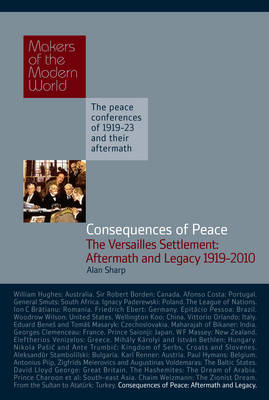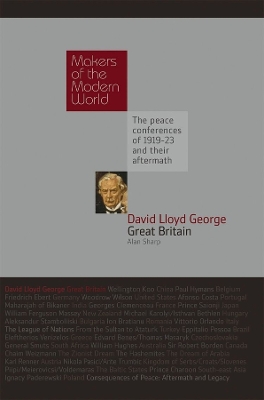Makers of the Modern World
3 total works
"Consequences of Peace: The Versailles Settlement - Aftermath and Legacy". This final volume in the Paris Peace Conference series will evaluate the immediate and later effects of the last great peace gathering which sought to settle the world's affairs at a stroke something that was not attempted after either the Second World War or the Cold War. The Versailles settlement has not enjoyed a great reputation. It has been blamed for causing a second major conflict within a generation, thus apparently fulfilling Marshal Foch's gloomy prediction that this is not a peace, it is an armistice for twenty years'. More recently commentators have suggested that the post-1989 ethnic disturbances in the Balkans and on the fringes of the former Soviet Union are the old chickens of Versailles coming home to roost'. The contemporary world still struggles to come to terms with the implications of President Woodrow Wilson's troublesome principle of national self-determination, and remains embroiled in the ambiguities and complexities of the Middle East, an area for whose boundaries and problems the Great War and settlement bear significant responsibility.
We are also still seeking to realise more effectively some of the nobler ambitions of the peacemakers, expressed in the Covenant of the League of Nations, in their concern for the human rights of minority nationalities left on the wrong side of the new borders that they sanctioned, and in their attempt to extend criminal responsibility for war beyond the operational irregularities of combatants to political and military leaders. Ninety years on, the settlement still casts a long shadow.
We are also still seeking to realise more effectively some of the nobler ambitions of the peacemakers, expressed in the Covenant of the League of Nations, in their concern for the human rights of minority nationalities left on the wrong side of the new borders that they sanctioned, and in their attempt to extend criminal responsibility for war beyond the operational irregularities of combatants to political and military leaders. Ninety years on, the settlement still casts a long shadow.
The end of the First World War saw Britain at the height of its power. Its fleet and air force were the largest in the world. Its armies had triumphed in the Middle East and spearheaded the final attacks in Western Europe that had driven the defeated Germans to seek an armistice. Britain now had to translate this military victory into the achievement of its war aims and future security and prosperity. Its main negotiator at the forthcoming peace conference would be its prime minister, the ebullient and enigmatic David Lloyd George (1863-1945), the "Welsh Wizard" - "the man who had won the war". Lloyd George's energy had maintained the war effort through the dark days of 1917 and early 1918, but now he anticipated, with relish, the prospect of winning the peace. Few were better equipped. He was a skilled and accomplished negotiator with the knack of reconciling the apparently irreconcilable. His admirers, of whom there were many, pointed to his brilliant and agile mind, his rapid grasp of complex questions and his powers of persuasion. His critics, who were also numerous, distrusted his sleight of hand, fleetness of foot and, frankly, his word.
His six months in Paris in 1919, as he pitted his wits against formidable world leaders like Woodrow Wilson and Georges Clemenceau, were among the most enjoyable but exhausting of his life. This study investigates the extent to which Lloyd George succeeded in his aims and evaluates the immediate and longer-term results of his negotiations for Britain.
His six months in Paris in 1919, as he pitted his wits against formidable world leaders like Woodrow Wilson and Georges Clemenceau, were among the most enjoyable but exhausting of his life. This study investigates the extent to which Lloyd George succeeded in his aims and evaluates the immediate and longer-term results of his negotiations for Britain.


